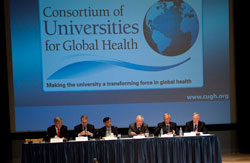Making a difference in global health
September - October, 2009 | Volume 8, Issue 5

Photo by Will Kirk, Johns Hopkins University
Five university presidents addressed the
Consortium of Universities for Global Health
Meeting and released a joint statement on the
importance of global health on their campuses.
From left, Dr. Mark Emmert, Dr. James Wagner,
Dr. Ronald Daniels, Dr. Michael Merson
(moderator), Dr. Richard Brodhead and
Dr. Robert Brown.
Guest Opinion by CUGH university presidents
The past decade has seen an enormous increase in the number of North American universities offering new programs addressing global health challenges. This remarkable response to the international global health crisis reflects the desire of our faculties and students to bring the unique resources of the university to bear on problems that require sustained, integrated, interdisciplinary, and collaborative approaches.
We must train the next generation of health professionals to help ensure a healthier future for people everywhere. While our schools of medicine, public health, and nursing are central to these efforts, the university has much more to offer. We recognize that to truly address the myriad of global health problems affecting the poor and disenfranchised requires more than good medicines and dedicated health care professionals. Our broader global health initiatives are building on our historical strengths.
For example, our schools of engineering, architecture and urban planning are able to address infrastructure needs for clean water and safe sewage systems and injury prevention. Our schools of public affairs and public policy and law develop policy and governance structures that promote health, and together with faculty in bioethics and philosophy address the human rights dimensions of global health and the challenges of achieving global justice more broadly.
Our students and faculty have enthusiastically embraced our growing investment in global health programs. Their desire to act is driven in part by the global communications revolution that brings the reality of human suffering and health inequities to everyone. We are excited by the evidence of interest and concern for global health that we see every day in our institutions, from our faculty, our students, and our staff. This is one of the best indications that our institutions will continue to foster global citizenship into this century and beyond, and we commit ourselves to involving our institutions in achieving a healthier, better educated, more equitable, and peaceful world.
We urge policymakers and health-related foreign assistance programs to use the resources and global health expertise of our universities to deliver high quality, evidence-based, cost-effective, and sustainable assistance to partner nations. We stand ready to do so.
However, there is a need for resources that will enable us to prevent disease and reduce mortality around the world by supporting the global health research, technology and engineering efforts of our faculty and more importantly, enable us to provide opportunities for the thousands of students, trainees and graduates of our universities and at our partner universities, which are clamoring to become involved and make a difference in global health.
President Robert A. Brown, Boston University
President Richard H. Brodhead, Duke University
President James W. Wagner, Emory University
President Ronald J. Daniels, Johns Hopkins University
Principal Heather Monroe-Blum, McGill University
President John L. Hennessy, Stanford University
President Mark G. Yudof, University of California
President Mark A. Emmert ,University of Washington
This statement, edited for space, was issued during the Consortium of Universities for Global Health meeting held at NIH.
To view Adobe PDF files,
download current, free accessible plug-ins from Adobe's website.